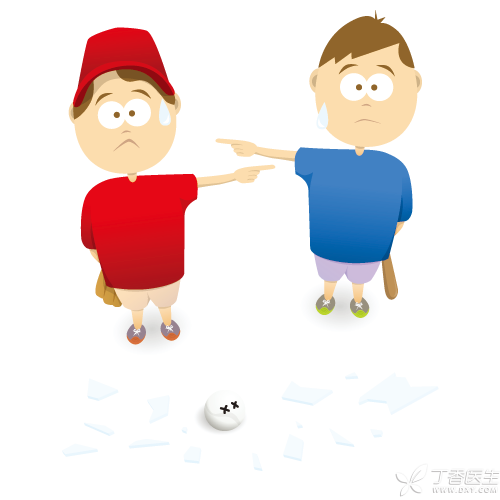
This morning, my 4-year-old daughter Tingting told me in an indifferent tone.
[You mean what? ! When? I asked in shock.
[Last Saturday morning, while you were still asleep.] She replied, and then described the detailed process. [Dad put one of your bras on him and jumped around on the sofa.] In the evening, I asked the child if her father had done such stupid things. Obviously, he did not.
We laughed, But I feel uneasy. If Tingting lied to avoid punishment, Or lie in order to get extra rewards, I can understand. But Tingting has often lied and boasted in order to make some puzzling [explosive news] recently, and she never admits that those fabricated stories are false. Should I stick to the principle and let her be honest in case she becomes a liar at an early age? Or should we let her go so as not to destroy her creativity?
Obviously, the latter should be chosen. I asked my psychological consultant friend for advice, and he thought it was normal for Tingting to make up stories. [She didn’t do anything wrong,] my friend told me. [Children of her age can’t distinguish between facts and fabrication.]
In fact, this type of lie is actually a good thing. [The higher the IQ of preschool children, the more likely they are to lie,] friends said, [the more skilled children lie in early childhood, the better their social skills are likely to be in adulthood.]
Of course, not all children’s lies can be laughed off-we certainly want our children to be honest. Therefore, understanding the characteristics and reasons of children’s lying at each age stage can help you gently guide your children to a level of honesty suitable for their age.
2 ~ 3 years old: tell the first [selfish] little lie,
There are two 2-year-old twin boys in the neighbor’s house. Recently, they often have a trick. When their mother finds out that one of them is dirty in diapers, she will ask them: “Who peed? At this time, the two brothers always say each other’s names at the same time. [They don’t want to go through the tedious diaper changing process, so they lie.] Their mother told me.
Such [selfish] lies are the first kind of lies produced by young children. Any mother of a preschool child will tell you that children at the age of three, sometimes even two, will tell some simple lies, such as denying that they have done something or getting some what for themselves.
What do parents do?
Children of this age do not know that it is wrong for them to lie, so if you want to make them realize that they have done something wrong by punishing them, it may only be in vain.
The best strategy is that when a child makes a mistake, the first thing to avoid is to force him to admit his mistake directly, but to find a way to let him say it himself.
For example, if you break a vase to your child, don’t force him to ask: “Did you break the vase?” ] But just describe to him what you saw: [Look, this vase is broken.] If you make angry inquiries, all you get is a lie.

3-5: Little people, talk big
Tingting’s big talk about his father wearing a bra is a typical expression of a 3-to 5-year-old child who has no clear line between fact and fiction. Children of this age also believe in the existence of [invisible friends], [horned monsters] and [fairies].
These seemingly absurd big words of preschool children, Maybe it’s just a game, Sometimes it is their small wish (Tingting’s imaginary friends never need to eat mushrooms, As a matter of fact, Tingting is often asked to eat mushrooms that she does not like. Moreover, They usually insist that the world they imagine is real. In fact, these big words they say are not real lies. What seems strange to adults may be just the unique way children process new information, or it can be seen as a manifestation of creativity.
What do parents do?
When your child’s big talk bothers you, don’t rush to reveal it. You can cooperate with him first and watch him quietly. If a child looks happy and has real friends, he will also communicate and interact with his family. Then there is no need to worry about his fantasy.
5-8: White lies
The sister’s family has two sons, 8-year-old Hao Hao and 6-year-old Ming Ming. Once, The toy car my sister just bought for them was damaged. But neither child admitted that he did it himself. From yelling at them at the beginning to luring them in various ways, After telling them that they can’t finish the meal without saying who broke it, Hao Hao finally stood up and admitted that he had broken it, but when his mother asked him the details of the damage, he began to show panic. In the end, he told the truth: [I didn’t do it in what, I just didn’t want you to ask any more.] Then Mingming-the real [culprit]-[wow] cried, [I don’t want you to think I’m a bad boy! ] Mingming cried and wronged to say the reason why he did not want to admit it.
Hao Hao’s act of taking the blame for his brother shows that he has reached an important stage of development-learning to tell white lies. This is a lie that benefits others or does not hurt their feelings.
However, the clear refusal to admit that they have done something wrong also shows that children between the ages of 5 and 8 will tell some lies for some understandable or even forgivable reasons-they will lie for fear of disappointing you or being punished.
Whether it is a white lie or a lie told in order not to disappoint you, it reflects the development characteristics of children at this stage-they have the ability to speculate on other people’s emotions.
What do parents do?
When you find your child lying, don’t rush to punish him or educate him. First, make sure that what drove him to lie.
If he is saying [white lies], he can be affirmed first. For example, in the above example, the mother can say to Hao Hao: “You lied to avoid punishment for your younger brother, you are a kind child.” But after affirming, he should also know the possible consequences of doing so: “But by doing so, my younger brother cannot become an honest and good child, right? Everyone must bravely admit that he has made a mistake.]
If he lied in order not to disappoint you or get away with punishment, then as parents, we need to reflect: [Am I too demanding of my children? Is my punishment for the child too heavy? ]

8 ~ 14 Years Old: Began to Have Little Secrets Not Willing to Tell
When children reach this age, they tend to hide some details of their lives. Don’t be surprised if your child doesn’t want to share everything about him with you. These new secrets don’t mean they have become dishonest, nor should they be used as a sign that the child has done something wrong.
In fact, this only reflects one thing-your children have become more mature. Children who are willing to share with their parents in what until they are 13 or 14 years old can only show that they have not grown up yet.
Of course, when your child becomes more independent, he may use this little trick to achieve some of his goals.
My friend’s child, This year is nine years old, His mother asked him to write reading notes every day and give them to her for examination. Suddenly one day, The child said to his mother: [Mom, You don’t have to rush me to write my reading notes every day, I’ll do it myself.] So my mother agreed to stop nagging, But let him be responsible for himself. Then, For the following whole month, my mother did not urge him to write his reading notes or check them, and the child also assured her that he had finished them on time every day. But when one month passed and my mother asked to check the reading notes again, she was shocked to find that her child had not even written a single one this month. [He lied to me for a month! ]
What do parents do?
Lies about homework, housework, brushing teeth, Although annoying, it is not uncommon at this age. The best way to respond is to express your unhappiness to the child concisely, then communicate patiently with the child, listen to the real reason why he lied, and start from the reason to help the child get rid of this bad habit, instead of blindly punishing him.
Children who are often anxious about their inability to handle situations are more likely to lie. Therefore, lying may be a sign that children are facing some pressure. In addition, it is also possible that children are smarter and find that lying is always a convenient strategy to help them achieve their goals.
Of course, the best way to make your child more honest is to set a good example for him. For example, don’t let the child squat down slightly to hide his true height in order to save tens or even several dollars for tickets or tickets.
At the same time, always tell him that lying will damage his credibility and destroy his relationship with the people around him. Such education may not be immediate, but as your child grows up, he will gradually give up those small lies and become an honest adult.
It should be noted that at any stage, if you find that your child is always habitually lying, you need to take him to seek professional help. For example, take her to see a child psychologist.
